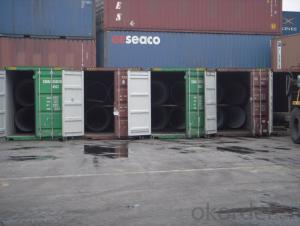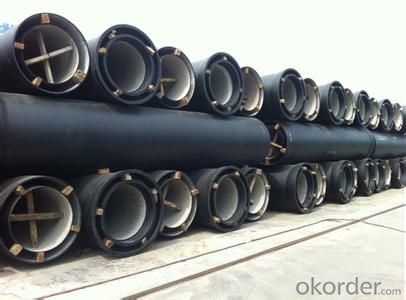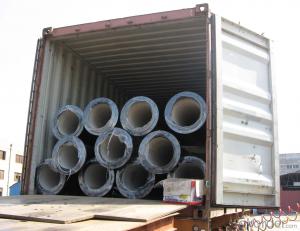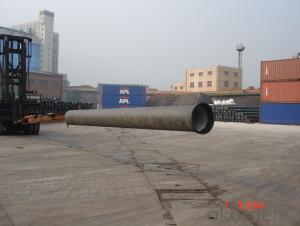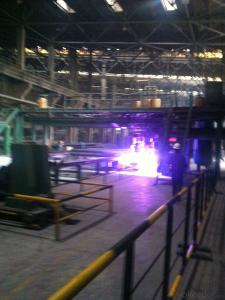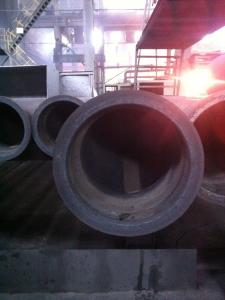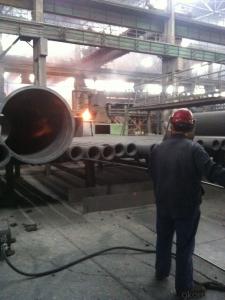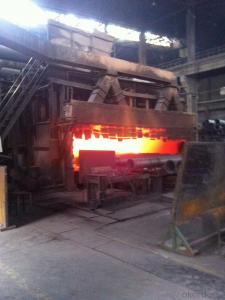DUCTILE IRON PIPE AND PIPE FITTINGS K8CLASS DN1600
- Loading Port:
- Tianjin
- Payment Terms:
- TT OR LC
- Min Order Qty:
- 23 pc
- Supply Capability:
- 3000 pc/month
OKorder Service Pledge
OKorder Financial Service
You Might Also Like
· Material : Ductile Cast Iron
· Size Range : DN 80mm to DN 2000mm
· Unit Effective Length : 6m or 5.7m
· Manufacture Standard: ISO 2531:1998/ EN 545:2006/EN 598:2007
· Annual capacity : 200,000 tons
· Coating Exterior: Zinc 130g/m2 according to ISO 8179-1 and bitumen coating 70 microns.
· Cement Interior: Portland Cement/ High Alumina Cement/ Sulphate Resisting Cement Lining according to ISO 4179
· Special requirements on external coating and internal lining can be applied
· We also provide accessories such as SBR/EPDM rubber gaskets, lubricant paste, pipe caps, PE sleeves, etc.
Additional Parts:
Each pipe is strictly inspected according to related standard to ensure permanently high performance.
Easy Installation at site and service free for life
Long Service Lifespan
Quotation will arrive you within 24hours once we get your inquiry.
We guarantee offering you a competitive price.
A copy of original inspection reports of pipes will be offered after shipment.
Photos of loading process will be sent to the customer after shipment effect.
We will follow-up the delivery progress after shipment effect and update to the customer on weekly basis.
- Q: The difference between HDPE pipe and ductile iron pipe
- Of different uses, ductile iron pipes are widely used for municipal water supply and drainage, rural drinking water and outdoor fire fighting works; mechanism cast iron pipes are mainly used in the city.
- Q: Are ductile iron pipes suitable for road crossings?
- Yes, ductile iron pipes are suitable for road crossings. Ductile iron is a strong and durable material that can withstand heavy loads and traffic. It has high tensile strength and flexibility, making it an ideal choice for underground installations beneath roads. Additionally, ductile iron pipes are resistant to corrosion and have a long lifespan, making them a reliable option for road crossings.
- Q: What is the expected bedding and backfill requirements for ductile iron pipes?
- To ensure the longevity and proper functioning of ductile iron pipes, it is crucial to meet the expected bedding and backfill requirements. Although these pipes are known for their durability and strength, careful installation is still necessary to prevent any potential damage or compromised performance. The bedding requirements for ductile iron pipes entail establishing a stable and uniform support system to distribute the loads and stresses from the surrounding soil. The pipe should be surrounded by a bedding material that is devoid of rocks, debris, or any sharp objects that could potentially cause harm. Moreover, the bedding material should be adequately compacted to prevent settlement or shifting, which could result in misalignment or pipe failure. Typically, a granular material such as sand or fine aggregate is employed as the bedding material for ductile iron pipes, with a minimum thickness of 6 inches. This material should be evenly placed beneath and around the pipe to provide a continuous support system. Additionally, it should be compacted to at least 90% of the maximum dry density to ensure proper stability and load distribution. As for the backfill requirements, they pertain to the material used to fill the remaining space around the pipe after the bedding has been installed. Similar to the bedding material, the backfill material should be free from rocks, debris, or sharp objects to prevent damage. It should offer support and protection to the pipe while allowing for proper compaction and settling. The backfill material for ductile iron pipes typically consists of a granular substance such as sand or fine aggregate, with a maximum particle size of 1 inch. It should be placed and compacted in layers, ensuring that the compaction is uniform and even around the pipe. Sufficient compaction is crucial to avoid settlement or shifting of the backfill material, which could potentially harm or misalign the pipe. In conclusion, meeting the expected bedding and backfill requirements for ductile iron pipes necessitates the use of a granular material that is free from rocks, debris, or sharp objects. This material should be evenly placed and compacted to provide stable support and protection to the pipe. Adhering to these requirements will help ensure the proper functioning and longevity of ductile iron pipe systems.
- Q: Are ductile iron pipes suitable for railway crossings?
- Yes, ductile iron pipes are suitable for railway crossings. Ductile iron has excellent strength and durability, making it capable of withstanding heavy loads and vibrations caused by passing trains. Additionally, its corrosion resistance properties make it a reliable choice for long-term use in this specific application.
- Q: Ductile iron gears are generally treated without heat treatment
- Heat treatment must be necessary, generally annealed first to machine, after quenching or nitriding treatment
- Q: What is the difference between a cast iron pipe and a ductile iron pipe?
- Nodular cast iron has high strength and strong plasticity. The tensile strength of ductile iron is twice that of gray iron, and the yield strength even exceeds that of cast steel.
- Q: What is a slide in type T flexible interface?
- There are many kinds of cast iron pipe interface. The commonly used interfaces include sliding type (T type) flexible interface, mechanical type (K type) flexible interface, mechanical type (NII type, SII type) flexible interface, flange type interface and special interfaceSliding type (T type) flexible interfaceSlide type (T type) flexible interface as shown below. The ductile interface is widely used in the DN I000mm following the cast iron pipe, has the advantages of simple structure, convenient installation, good sealing characteristics. In the socket structure considering the location of the rubber ring and the deflection angle, this interface can adapt to deformation a certain foundation, has certain anti vibration ability, at the same time using the deflection angle of the long distance pipeline to achieve steering.
- Q: How can the three pipes of ductile iron leak?
- When the pipe connection of the three water leakage, first of all to see whether it is to do the pipe three links of the manufacturers, pressure did not reach, if it is. It is only the replacement, if not, with cast iron electrode welding, or socket connection half!
- Q: How can stainless steel pipes and ductile iron pipes be joined?
- The utility model can be connected with a wide range flange joint or a wide range flexible joint
- Q: Can ductile iron pipe be recycled?
- Yes, ductile iron pipe can be recycled. Ductile iron is a type of iron that is commonly used in the manufacturing of pipes due to its high strength and durability. When a ductile iron pipe reaches the end of its useful life, it can be recycled by melting it down and using the molten iron to create new products. Recycling ductile iron pipe not only helps conserve natural resources but also reduces the need for raw materials and energy-intensive processes involved in manufacturing new pipes. Additionally, recycling ductile iron pipe helps minimize waste and contributes to a more sustainable and environmentally friendly approach to infrastructure development.
Send your message to us
DUCTILE IRON PIPE AND PIPE FITTINGS K8CLASS DN1600
- Loading Port:
- Tianjin
- Payment Terms:
- TT OR LC
- Min Order Qty:
- 23 pc
- Supply Capability:
- 3000 pc/month
OKorder Service Pledge
OKorder Financial Service
Similar products
Hot products
Hot Searches
Related keywords

